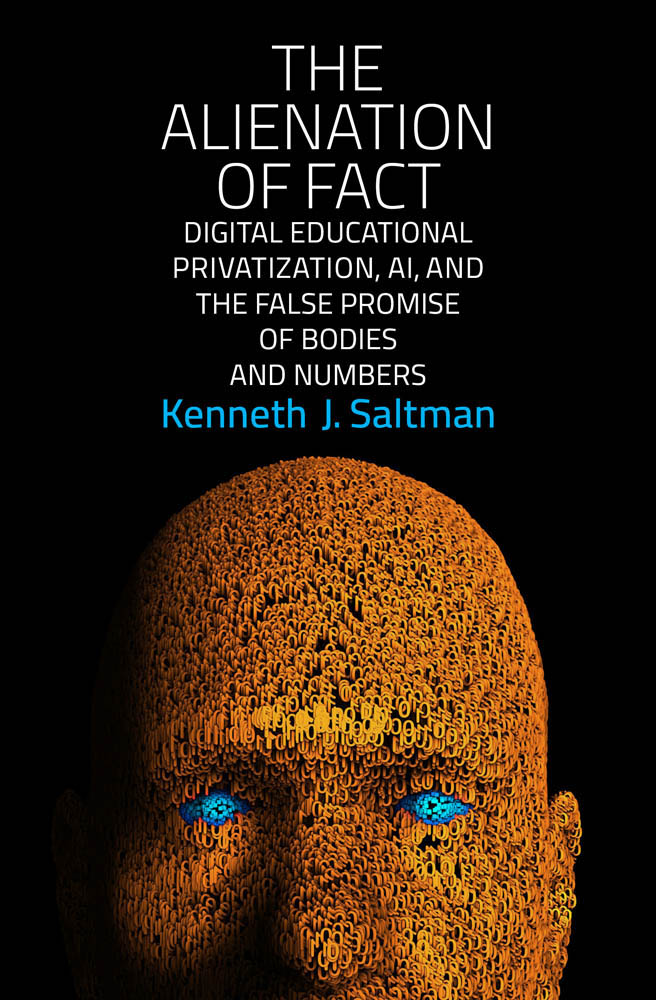Contents
Guide
Pagebreaks of the print version

THE ALIENATION OF FACT
Digital Educational Privatization, AI, and the False Promise of Bodies and Numbers
Kenneth J. Saltman
The MIT Press
Cambridge, Massachusetts
London, England
2022 Massachusetts Institute of Technology
This work is subject to a Creative Commons CC-BY-NC-ND license.
Subject to such license, all rights are reserved.

The MIT Press would like to thank the anonymous peer reviewers who provided comments on drafts of this book. The generous work of academic experts is essential for establishing the authority and quality of our publications. We acknowledge with gratitude the contributions of these otherwise uncredited readers.
Library of Congress Cataloging-in-Publication Data is available.
Names: Saltman, Kenneth J., 1969 author.
Title: The alienation of fact : digital educational privatization, AI, and the false promise of bodies and numbers / Kenneth J. Saltman.
Description: Cambridge, Massachusetts : The MIT Press, [2022] | Includes bibliographical references and index.
Identifiers: LCCN 2022005023 (print) | LCCN 2022005024 (ebook) | ISBN 9780262544368 (Paperback) | ISBN 9780262371735 (PDF) | ISBN 9780262371742 (ePub)
Subjects: LCSH: Artificial intelligenceEducational applications. | Privatization in education. | Verification (Empiricism)
Classification: LCC LB1028.43 .S26 2022 (print) | LCC LB1028.43 (ebook) | DDC 370.285dc23/eng/20220608
LC record available at https://lccn.loc.gov/2022005023
LC ebook record available at https://lccn.loc.gov/2022005024
d_r0
CONTENTS
PREFACE
Economic inequality, the devastation of global warming, the threat of nuclear annihilation, and the failure of politics to address these existential threats drives material and symbolic precarity.
In the face of material and symbolic precarity and the erosion of the traditional mechanisms for individual and collective agency, people grasp for certainty. To be clear, journalism, politics, and education have been systematically undermined as instruments of collective action and self-governance. Growing inequality, precarity, and crises of agency have caused many people to succumb to the assurance of certainty offered by fundamentalisms and authoritarianism. mystify the causes of inequality; scapegoat the vulnerable; attack science, education, and truth; and offer themselves up as identifications with strength. The swindle of authoritarianism depends on a false guarantee of security and certainty. This book details a pattern. In the face of precarity, insecurity, and the erosion of the traditional forms of agency, people are desperately grasping for foundations in forms that falsely appeal to concreteness: numbers and bodies.
The turn to the false foundational guarantees of numbers and bodies can be found across institutions and fields. As digital technology amplifies audit culture
In education, this contradiction around fact appears omnipresenteverything must be data driven, and yet policy proceeds free of evidence, argument, or theoretical justification. The misrepresention of learning as quantifiable test outcomes continues in both traditional and new high-tech forms. Affect and behavior must now be quantifiably measured, and the body comes increasingly to be rendered as data. Online education platforms, biometric pedagogy and surveillance devices, adaptive learning technologies, and avatars for social and emotional learning are just some of the growing data-generating industries involved in for-profit contracting. Yet policiesparticularly market-based ones like chartering, vouchers, and these innumerable tech platformsexpand without evidence for their efficacy or adequate theoretical justifications. I call this contradiction between the imperative for data and the evacuation of argument, evidence, and theory the alienation of fact. Increasingly, claims about essentialized others and their bodies and decontextualized numbers ground assertions of truth in place of argument and evidence. This book aims to make sense of this contradiction, particularly as it has been brought about in part by destructive trends in public schooling.
The chapters of this book illustrate the alienation of fact through different cases and different educational domains: from AI education to The LEGO Groups quantification of play, from the digitalization of social and emotional learning to the privatized corporeal politics of biometric pedagogy, safe spaces, affinity groups, and rampant conspiracy theories. The false promise of control in manipulating data and manipulating bodies turns the pursuit of rational progress into a frenzy of irrationalism.
At the outset of the pandemic, leading scholars of educational technology, such as Ben Williamson, and the journal Learning Media and Technology warned that much needed to be studied before jumping to conclusions about the implications of widespread online education. Meanwhile, in the United States, the COVID-19 case numbers illustrated in charts and graphs represented sick and dead bodies standing in for a missing concerted plan or policy to control the virustesting, tracking, and quarantining that succeeded in numerous nations. The only agency provided to most citizens was the consumption of data about the casualties while the federal government under Trump largely abdicated responsibility for a coordinated response in the name of market fundamentalismreopening and getting back to business.
This book aims to make sense of a puzzling phenomenon. If there is an imperative for data collection, data-based decision making, empiricist turns in the humanities and social sciences, and the expansion of data science to all social realms, why is there also a flagrant and seemingly growing disregard for fact, evidence, and truth? I provide a few answers in this book. I argue that the very turn to decontextualized data as truth revives and reworks the culture of positivism and carries with it a disregard for the assumptions, values, ideologies, and theories that undergird truth claims. The rendering of all things not just into abstract markers of monetary exchange but also into abstract units of data produces an allure for the concrete, the material, the certain, and the secure. In place of argument, evidence, and theory, in such a context, bodies and numbers provide a particular attraction. As part of the alienation of fact, conspiracy theory explains social events not through social theory and the dialectical interplay of social structure and agency but through the inexplicable workings of salvational strongman superagents endowed with a mystical capacity to move history and conspiratorial secret agentsminorities and womenconspiring to corporeally replace white Christian men.
Rising authoritarianism depends on an attack on truth. Donald Trump, Viktor Orban, Rodrigo Duterte, Vladimir Putin, Jair Bolsonaro, Abdel Fattah el-Sisi, Recep Tayyan Erdogan, Narendra Modi, and Benjamin Netanyahu, to name a few authoritarians, have undermined knowledge-making institutions, including schools and universities, news media outlets and journalists, and venues for free expression. They seek to delegitimate the very possibility of knowing, so that knowledge is equated with authority and truth resides in the strongman. In this book, I argue that the legacies of positivism in mainstream education, news, and corporate media contribute to and have been a precondition for the crisis of truth that drives the popular turn toward authoritarian leaders. These trends in the realm of culture and politics need to be understood in relation to broader political economic tendencies driving the alienation of fact.













